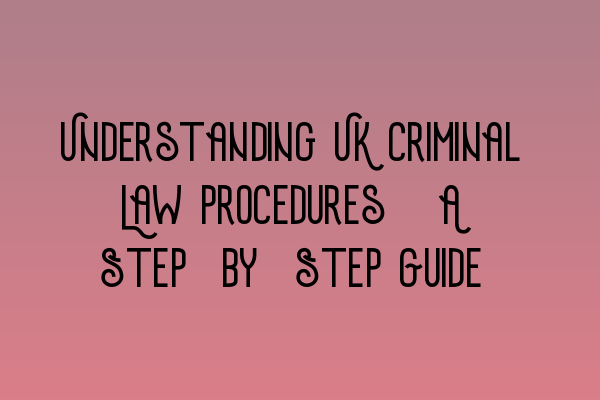Understanding UK Criminal Law Procedures: A Step-by-Step Guide
If you find yourself embroiled in a criminal case in the UK, it is crucial to have a comprehensive understanding of the criminal law procedures. Navigating through the legal complexities can be overwhelming, but with the right knowledge, you can be better prepared to face the legal challenges head-on. In this step-by-step guide, we will walk you through the key stages of the criminal law process in the UK. So, let’s dive in!
1. Investigation:
The first stage of the criminal law procedures is the investigation. This involves the collection of evidence by law enforcement agencies such as the police. They will gather witness statements, forensic evidence, and any other relevant information to build their case.
2. Arrest:
If the police have sufficient evidence to suspect your involvement in a crime, they may arrest you. During the arrest, you will be informed of your rights and the reasons for your arrest. It is essential to stay calm and cooperate with the police during this process.
3. Interview:
Once you have been arrested, you may be taken to a police station for questioning. The police will conduct an interview to gather more information and evidence. It is vital to have legal representation during this stage to ensure your rights are protected.
4. Charge:
After the interview, the police will decide whether to charge you with a criminal offense. If they believe there is enough evidence to proceed, they will formally charge you. At this point, it is crucial to seek legal advice to understand the nature of the charges against you and the potential consequences.
5. Bail or Remand:
If you have been charged, you may be released on bail or held in custody. Bail allows you to be released from custody with certain conditions, such as attending court hearings. However, in some cases, the court may decide to remand you, which means you will be held in custody until your trial.
6. Court Proceedings:
The next stage of the criminal law procedures is attending court. This is where the legal arguments and evidence are presented. Depending on the nature of the offense, your case will be heard in either the Magistrates’ Court or the Crown Court.
In the Magistrates’ Court, less serious offenses are dealt with by a magistrate or a panel of magistrates. In the Crown Court, more serious offenses are heard by a judge and jury.
7. Plea:
During the court proceedings, you will have the opportunity to enter a plea. You can either plead guilty or not guilty to the charges against you. It is essential to seek legal advice before making this decision, as it can have significant consequences for your case.
8. Trial:
If you plead not guilty, your case will proceed to trial. The prosecution will present their evidence, and your defense team will have the opportunity to challenge the evidence and present your side of the story. The judge or jury will then decide whether you are guilty or not guilty.
9. Sentencing:
If you are found guilty, the court will proceed to the sentencing stage. The judge will consider various factors, including the seriousness of the offense and your personal circumstances, to determine an appropriate sentence. Sentences can range from fines to imprisonment, depending on the severity of the crime.
10. Appeals:
If you are unhappy with the outcome of your trial or the sentence imposed, you have the right to appeal. The appeals process allows you to challenge the decision made by the court and seek a different outcome. It is crucial to seek legal advice if you wish to pursue an appeal.
Understanding UK criminal law procedures is vital to navigate the legal system effectively. It enables you to be better prepared and make informed decisions regarding your case. If you require legal assistance or advice, it is always recommended to consult a qualified criminal defense solicitor.
For further resources and information related to UK criminal law and the SQE exams, you may find the following articles helpful:
– SQE 1 Practice Exam Questions
– SQE 1 Practice Mocks FLK1 FLK2
– SQE 2 Preparation Courses
– SQE 1 Preparation Courses
– SRA SQE Exam Dates
Remember, seeking professional legal advice is always recommended when dealing with criminal law matters.
